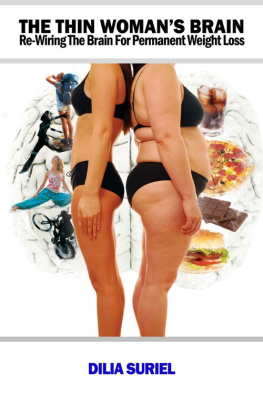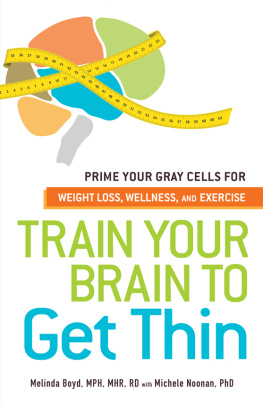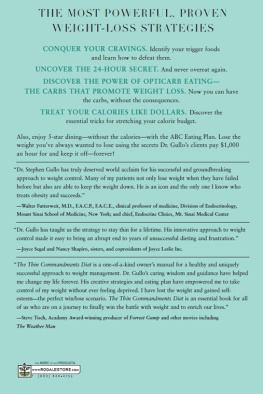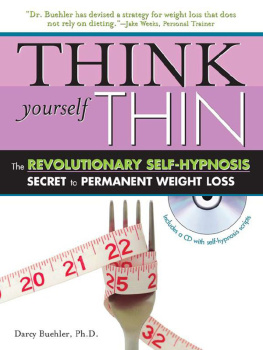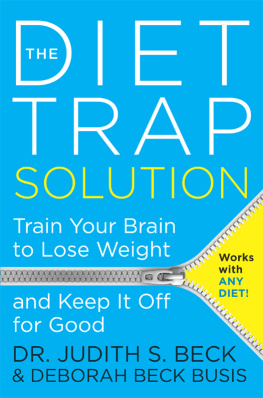The
Thin Womans
Brain
Re-wiring the Brain for
Permanent Weight Loss
Dilia Suriel
Copyright Dilia Suriel
This book is published by Applied Insight, Inc. No part of this book may be reproduced by any mechanical, photographic recording, nor may it be stored in retrieval system, transmitted, translated into another language, or otherwise copied for public or private use without the permission of the publisher, excepting brief passages quoted for sole purposes of critical review.
The author of this book does not presume to offer psychological therapy nor advocate the use of any technique for the treatment of any specific or traumatic psychological condition without the approval and guidance of a qualified psychotherapist. The intent of the author is to convey personal experience in the hope that it may be of help in others personal quest for permanent weight loss and the eradication of overeating. If you use any of the information as a form of self-therapy, the author and publisher assume no responsibility or liability for your actions.
Release 1:October 2013
I.S.B.N. 0-9744092-7-8
Published by:
Applied Insight, Inc.
A Colorado Based Corporation
Visit our website:
www.thinwomanbrain.com
Library of Congress cataloging-in publication data:
Suriel, Dilia
The Thin Womans Brain: Re-wiring the Brain for Permanent Weight Loss/1
ISBN 0-9744092-7-8
Topics:
1. Weight Loss2. Rewiring for Weight Loss3. Neuroplasticity4. Cognitive Behavioral Therapy for Weight Loss5. Alternatives to Dieting6. Self-Help7. Lifelong Weight Loss8. CBT for Weight Loss9. CBT and Dieting10. Holistic Weight Loss
It is my belief that humanity will evolve because of female consciousness. A substantial amount of our potential is squandered when so many women feel ashamed of their bodies. If just 1% of this wasted energy could be re-channeled toward positive activities, our entire race would be richly blessed.
\
Table of Contents
Chapter 1 La Gordita
Wired to Overeat
Every year over 10,000 diet books hit the market. Unfortunately 90% of these books are just reshuffling the chairs on the Titanic. They are just:
a) Atkins with a new lipstick, orb) Paleo Paleo Paleo, orc) So challenging that if you exerted the effort required by the diet regiment, let alone afford all of the ingredients, you would lose weight by the sheer effort necessary to follow the diet.
But here is the most important statistic that anyone considering losing weight should know. Most of the people who manage to lose weight dieting, gain the weight back within the first year! This includes people who have participated in The Biggest Loser or had their stomach stapled. This is the most repressed statistic in the diet industry: Only 3 out of every 100 people who reach their goal manage to maintain that weight loss beyond the first year. Take one solid minute to truly ponder the consequences of that statistic:
Visualize yourself as part of a group of 100 enthusiastic, committed people, who through food restriction and significant exercise generate a daily caloric deficiency. Now visualize that this group has the perseverance and stamina to stick to that regimen for months, whatever is necessary, AND all of the members of this admirable group actually reach their weight goal. Hurray! What an amazing achievement! One year later these 100 extraordinary people reconvene and to their shock only three remain at their weight loss goal. The remaining 97 have either returned to their weight prior to the regimen or have actually gained more weight than when they started the program! Only three, 3, not even nine, but three, have managed to keep the weight off!
Are we really that spineless? Do we really lack that much willpower? Or is there another explanation? If you conduct a postmortem with the 97 people that could not claw onto their hard-fought weight loss, what you will find is that after they attempted to go back to normal eating they experienced hunger far more often than prior to the weight loss program. Since ending the diet they also have become preoccupied, some even obsessed with food.
There is a little known organization named the National Weight Control Registry. Their database tracks individuals that have managed to maintain more than 30 pounds of weight loss for more than twelve months. The objective of this organization is to learn why certain individuals are able to hold onto their weight loss. In December 2011, the New York Times published an article where they interviewed some of these extraordinary individuals. The successful dieters shared how they have to maintain hyper-vigilance to retain their lost weight. Many of them still have to count calories every single day; some of them call ahead to restaurants before they attempt a meal out. The Times reported that for these individuals weight maintenance efforts are as much work as losing the weight itself. It is a time-consuming, carefully planned, lifelong commitment, predicated on unwavering willpower, far from peaceful thinness, it is very hard work. Even spokesperson for national weight loss companies report that the effort required to keep the weight off is as significant as the effort exerted to lose the extra weight.
But lets examine one simple fact. There was a time in our lives where maintaining a healthy weight was not a struggle. There was a time when we were lean without counting anything. There was a time that we didnt obsess about food, there was a time when we didnt eat compulsively. Then there are the other questions: Why are we different from women who dont have these types of food struggle and are thin? What has been altered? That was the pivotal question that changed my life!
Let me introduced myself. I was trained as a scientist and majored in physics and mathematics at a prestigious university. After undergraduate school, I pursued a masters degree first in electrical engineering, finally settling into computer science. For my entire professional career I worked in the computer industry in jobs ranging from interface engineer to professor of programming languages, culminating at director-level international consulting engagements. I have a track record of solving complex corporate problems and have worked in eight distinct cultures. And while Im not looking to impress you with my credentials, I do want to share that Im a world-class analyst. I just happened to wake up one day knowing that I needed to use my analytical talents to end the dieting hell that Ive lived for too many years.
Until the age of 26, I was naturally thin, then for three years, I had invested my hopes, my dreams and fourteen hours a day, seven days a week in my own business. I gained forty pounds during that period of time. Forty pounds! When I finally emerged from the grind of the new business with compulsive weight training and dieting, I lost the forty pounds.
But something within me was no longer satisfied with my normal weight. Even though I had bludgeoned myself back to my original weight, I was now seduced by my newfound weight-losing skill; I was now shooting for the latest idol . My models were no longer the voluptuous bodies of the movie stars of the 60s, the Raquel Welch, Brigitte Bardot and Ursula Andrews. My new ideal had morphed to Twiggy, whose body looked like an undernourished teenage boy. I stayed in diet mode because I no longer felt good about my weight. My ideal had transfigured from a size 12 to a size 3, and I couldnt experience myself as attractive in a size 8.
The cycle of losing weight, gaining weight remained for most of my adult life. I believed that the right tools would help me eat less and move more you know the mantra. I believed what those helpful friends did, that all I needed was BETTER INFORMATION about food and exercise! But in reality I was an expert on all of that. The worst of it was the self-hatred: I was La Gordita, the fat woman. I felt drained. My self-loathing undermined the faith I needed to lose weight. The oppressive shame of living as a fat woman was emotionally damaging. But I never gave up. I continued to diet because like most of the population I believed that was my only option until I noticed that thin women were different and I caught a glimpse of my pre-diet days.
Next page
